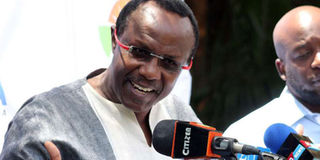Government response to Nasa inappropriate as it polarises an already divided country

National Super Alliance People's Assembly Organising Committee Chairman David Ndii addresses the media at Okoa Kenya offices in Nairobi on February 7, 2018. Some members of Nasa have been charged with treason. PHOTO | DENNIS ONSONGO | NATION MEDIA GROUP
What you need to know:
- Since then, the National Resistance Movement has been declared a criminal organisation, opposition leaders have been arrested.
- If the government is really interested in cohesion it needs to change its approach.
On the day of Raila Odinga’s unofficial "swearing-in" as the country’s ‘People’s President’, much of the media attention focused — not on the short ceremony in Uhuru Park, or even on the non-appearance of Odinga’s co-principals — but on the shutdown of three TV stations.
Since then, the National Resistance Movement (NRM) has been declared a criminal organisation, opposition leaders have been arrested and one has been deported, court orders have been ignored, several MPs have had their vehicles impounded, the list goes on.
I did not support the opposition’s decision to stage a swearing-in ceremony.
Problems around the August 8 polls led the Supreme Court to nullify that election.
COURT ORDERS
As a result, no one — neither Uhuru Kenyatta nor Odinga — won and a ‘fresh’ election was held.
Given the same electoral commission and rules and regulations remained in place, I understand the opposition’s decision to boycott the October polls.
But the outcome was that Odinga did not participate in and thus could not win them.
However, my opinion on that matter does not alter my rejection of the government’s response.
Some actions (such as ignoring court orders) are simply illegal.
Others, while they might have officially been conducted within the law, are against the spirit of the 2010 Constitution.
INJUSTICES
However, given such debates have already received press coverage, let me focus on a related topic; namely, how this display of State power is also counter-productive and further polarises Kenyans along partisan and ethnic lines.
Nasa’s focus on ‘electoral injustice’ can only be understood if one recognises how the 2017 election took place in the shadow of a much longer history of perceived injustices.
Particularly significant in this regard is the fallout between President Jomo Kenyatta and Vice-President Oginga Odinga in the 1960s, which led Oginga to leave the ruling Kenya African National Union (Kanu) and establish the Kenya People’s Union (KPU).
OGINGA BOXED OUT
As Susanne Mueller has argued in the Journal of Modern African Studies, the State’s subsequent use of resources and sanctions undermined the KPU’s capacity; the party was then banned in 1969 after Tom Mboya’s murder and violence in Kisumu.
In 1978, Kenyatta was succeeded by Daniel arap Moi who, after a brief rapprochement with Oginga, also sidelined the veteran politician.
In turn, when Odinga tried to form an opposition party in 1982, Moi declared Kenya a de jure one-party state.
During the 1980s, the opposition grew, leading to the reintroduction of multiparty politics in 1991 whereupon Moi went on to use a ‘menu of manipulation’ to win two elections against a divided opposition.
CORRUPTION
Things changed in 2002 when Moi handed over the reigns of Kanu to Uhuru Kenyatta and the opposition came together in the National Rainbow Coalition (Narc) behind Mwai Kibaki.
However, the optimism that surrounded Kibaki’s victory was soon undermined by new corruption scandals, claims of ethnic bias, and opposition to a proposed new constitution; and as Raila Odinga claimed that his support for Kibaki’s election had been betrayed.
In 2007, Kibaki was re-elected in polls widely believed to have been rigged.
The subsequent dispute triggered an unprecedented crisis, which was only brought to an end by a power-sharing agreement that brought Odinga into government as Prime Minister.
MARGINALISATION
In 2013, Odinga lost to another establishment candidate when Kenyatta secured a surprise first round victory with 50.07 per cent of the vote.
In turn, while Odinga did not challenge the Supreme Court’s validation of the results, he continued to insist that another election had been stolen.
This (admittedly grossly truncated) history is important – not because Kenyans are unaware of it – but because memories of the same lie at the heart of current politics.
As the opposition links the current regime to its predecessors and views the problems of 2017 as part of a longer history of injustice and associated marginalisation, and others dismiss Odinga as a troublemaker who seeks another political settlement.
RULE OF LAW
Unfortunately, the government’s current backlash does nothing to bridge this divide, and only further reinforces an opposition narrative of the government as the inheritor of corrupt and authoritarian governance.
The implication: If the government is really interested in cohesion it needs to change its approach.
The same is also true if it is interested in the rule of law and upholding the 2010 Constitution.
Gabrielle Lynch is a Professor of Comparative Politics, University of Warwick. [email protected]





